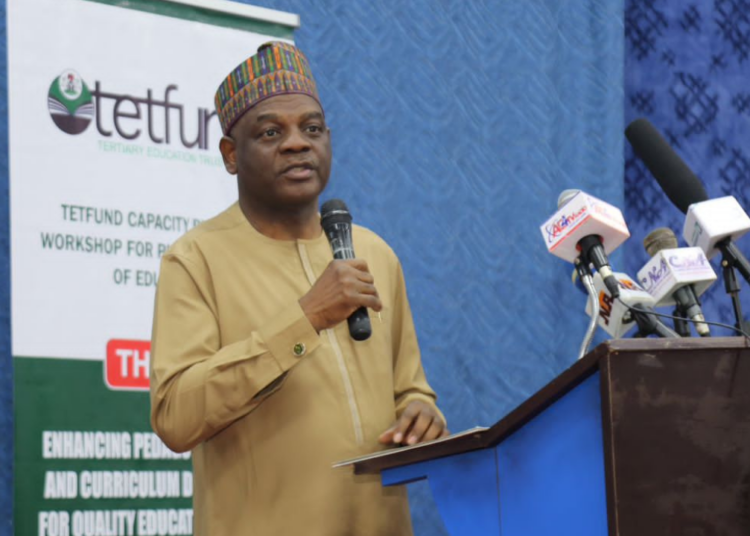In a landmark The Tertiary Education Trust Fund (TETFund) and the Nigeria Extractive Industries Transparency Initiative (NEITI) have signed a Memorandum of Understanding (MoU) to deepen collaboration on data and information sharing in order to bolster accountability in Nigeria’s education and extractive sectors.
The goal is to enhance transparency in remittances, plug revenue leakages, and ensure that taxes due to the Education Tax Fund are promptly and fully remitted.
The signing ceremony, held in Abuja, marked the formal beginning of a strategic alliance between two institutions with intertwined mission.
For TETFund, this partnership represents a critical opportunity to improve revenue collection and ensure that the Education Tax is not only paid by liable companies but tracked to its final deployment.
For NEITI, the agreement underscores a broader mandate to ensure that Nigeria’s natural resource wealth is transparently managed and efficiently deployed for development.
Executive Secretary of TETFund, Arc. Sonny Echono, described the MoU as a vital framework that will allow both institutions to synchronise their data systems and processes in tracking education tax remittances, especially from the oil and gas sector.
He said, “This agreement ensures that taxes due to the Education Tax Fund are accurately assessed, collected, and tracked. We are working towards a transparent mechanism that not only verifies payments but also recovers funds where necessary. This directly supports President Bola Tinubu’s Renewed Hope Agenda of restoring our educational institutions as engines of national transformation.”
He explained that beyond managing expenditure, TETFund is intensifying efforts to grow its revenue base and improve collection efficiency.
He cited the establishment of a Department of Revenue and Investment a recent innovation approved by the Fund’s Board of Trustees as a game-changer in boosting collections across its zonal offices.
“This department has deployed officers who now collaborate closely with the Federal Inland Revenue Service (FIRS) to verify the compliance of tax-paying entities. Some entities, especially those operating offshore, present more complex cases, but this partnership with NEITI will provide the clarity and verification we need,” Echono said.
He also addressed concerns around ongoing tax reforms, assuring stakeholders that while terminology may evolve, for instance, replacing ‘Education Tax’ with ‘Development Levy’ TETFund will continue to receive 50% of collections under the new regime, with mechanisms for tracking and transparency remaining intact under the MoU.
Dr. Orji Ogbonnaya Orji, Executive Secretary of NEITI, hailed the partnership as “timely and significant,” pointing out that both agencies are united by the common goal of ensuring that revenues from Nigeria’s natural resources are not only transparently managed but wisely invested in national development.
“TETFund is a key player in converting our finite mineral wealth into infinite human capital..No country achieves lasting prosperity by exporting raw resources. The real wealth of a nation lies not in its minerals, but in the minds of its people,” Orji said.
Dr. Orji revealed that between 2019 and 2023, TETFund recorded revenue accruals of approximately N1.024 trillion through the Education Tax much of it from companies in sectors audited by NEITI, including oil, gas, mining, manufacturing, and telecommunications.
However, he clarified that accruals are not always equal to actual remittances, highlighting the importance of data validation and real-time monitoring.
“In 2022, TETFund received N322.99 billion. That rose significantly in 2023 to N571.01 billion, the highest ever. These figures highlight the extractive sector’s central role in funding education. Under this MoU, NEITI will provide TETFund with real-time data to ensure early detection of discrepancies and improve accountability in remittances,” he said.
Beyond improving financial transparency, the partnership aims to foster deeper ties between government institutions and academia. According to Dr. Orji, NEITI’s data will empower researchers, support evidence-based policymaking, and inspire reforms that cut across education and governance.
“We are bridging the gap between town and gown. This MoU enables us to deliver data that supports TETFund’s planning and forecasting while also serving as a resource for academic research, innovation, and public accountability.”
The collaboration, he added, aligns with national aspirations to elevate public tertiary institutions by strengthening their infrastructure, scholarship access, and research ecosystems.
“Our joint effort will uplift educational institutions, expand access to learning, and strengthen innovation across Nigeria’s tertiary education landscape,” Orji added.
Permanent Secretary of the Federal Ministry of Education, Abel Olumuyiwa Enitan, also endorsed the initiative, describing it as a welcome development that promises sustainable impact for education in Nigeria.
“If this revenue stream is properly tracked and harnessed, it will lead to more development in the education sector. The ripple effect will benefit not just this generation but future ones. It is a move rooted in transparency, and the ministry wholeheartedly supports it.”
He emphasised the government’s commitment to maximizing all available revenue streams to reduce pressure on national finances and ensure that education remains a priority.
The NEITI-TETFund MoU stands as a model of institutional collaboration one that demonstrates the power of aligning missions to achieve shared national goals. It’s a commitment not just between two agencies but a covenant with the Nigerian people, to ensure that every naira drawn from the nation’s wealth is invested where it matters most: in the minds of its youth.
Dr. Orji concluded his remarks with a call to collective responsibility, “The over N1.5 trillion that has accrued to TETFund in just five years must be fully accounted for, efficiently deployed, and transparently tracked. It must translate to modern libraries, functional laboratories, revitalised lecture halls, and cutting-edge research that meets the challenges of the 21st century.”
He added that with this partnership, the two institutions commit to measurable impact, open data exchange, and a future built on education, transparency, and transformation.
The signing of this MoU signals a new era of partnership that connects the dots between natural resources and human development. It affirms that data is not just a bureaucratic tool, but a catalyst for reform. And it reaffirms that transparency is not an end in itself, but a path to equity, prosperity, and national progress.





